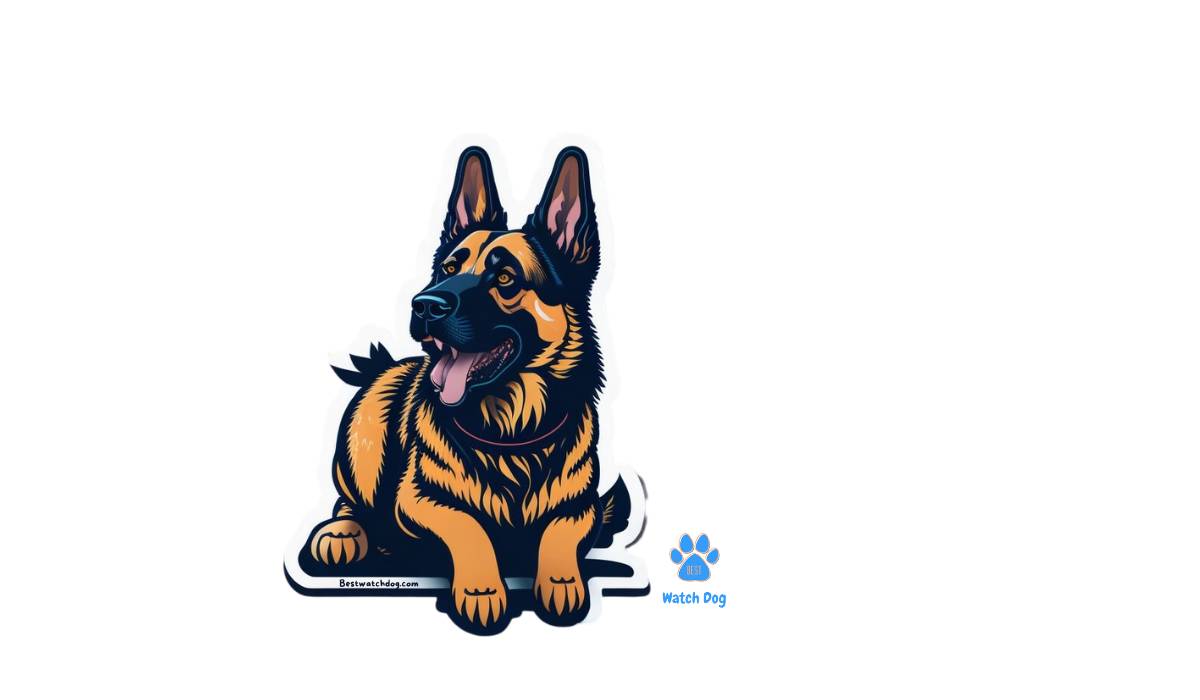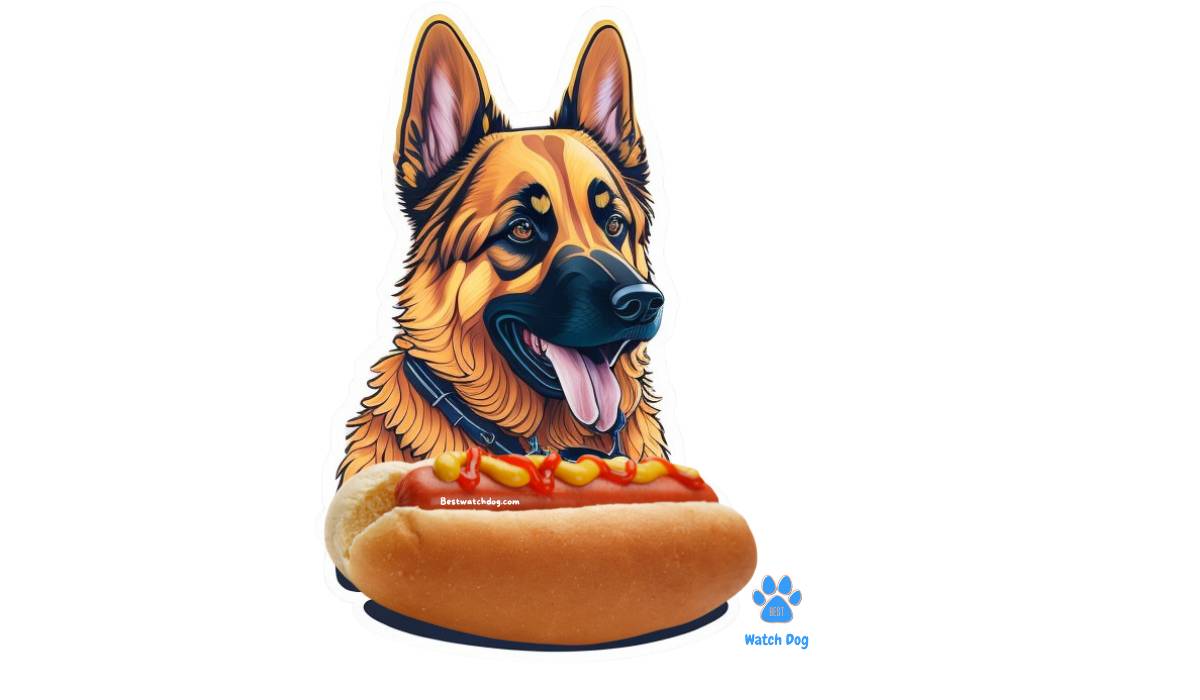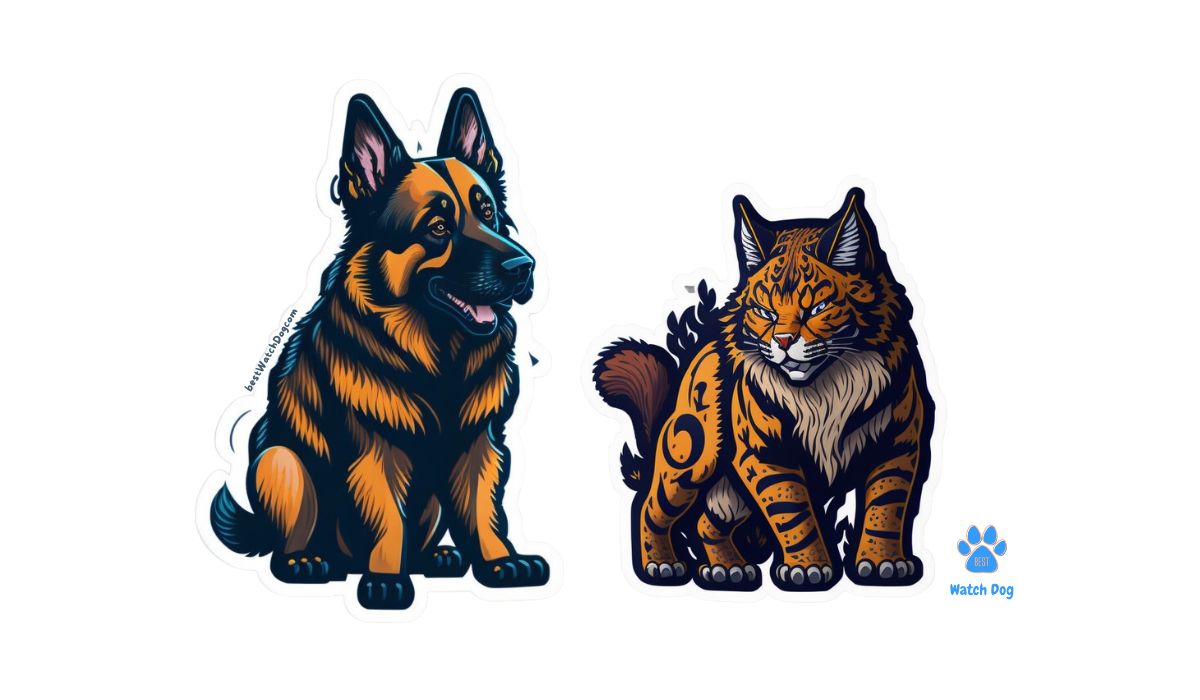Raccoons, cute yet notorious, have increasingly been invading our neighborhoods, posing a significant threat to our pets, especially our beloved German Shepherds.
The burning question keeps many pet owners awake at night: can a raccoon kill a German Shepherd?
With their sharp claws and teeth, raccoons are not to be underestimated.
In this blog post, I will investigate the dangers raccoons pose to your GSD.
I will also provide solutions to keep your German Shepherd safe and sound, ensuring that you both enjoy a worry-free life together.

Can A Raccoon Kill A German Shepherd?
While a raccoon can kill a German Shepherd, it’s unlikely. Raccoons usually avoid confrontation with big animals but might attack in self-defense if threatened.
Remember that raccoons can carry diseases that can be passed on to dogs, so it’s best to keep your dog away from raccoons and other wild animals to prevent any harm.
Raccoons are clever and learn the ins and outs of a neighborhood, figuring out when it’s safe to roam around.
They might go on the offensive to protect themselves if they feel cornered or threatened.
Smaller dogs are at greater risk, but any pet could get hurt by those sharp raccoon teeth and claws.
When a Raccoon attacks a dog, they usually don’t target pets unless they have rabies. Raccoons can bite and scratch with incredible speed and ferocity, and their bites can cause severe damage.
If a raccoon attacks a dog, it’ll try to scratch its eyes first, then flip the dog over and go for the gut if it can.
To protect your dog, don’t leave them outside alone, especially at night. If you encounter a raccoon while walking your dog, back away slowly and keep your dog away from it.
If a raccoon attacks your dog, make a lot of noise to scare it off, or throw a rock or stick if you have to. (1.)
5 Reasons Why Raccoons And German Shepherds May Come Into Conflict
Let’s dive into 5 reasons why raccoons and German Shepherds might clash:
It’s In Their Nature: German Shepherds have a strong prey drive, so they might see raccoons as potential prey, causing some tension between the two.
Home Sweet Home: German Shepherds are super protective of their territory. If they spot a raccoon intruding, they might get confrontational to defend their home or owners.
Chow Time: Both raccoons and German Shepherds need to eat, and they might end up fighting over the same food source, like garbage or pet food left outdoors.
Mama Bear Mode: Female raccoons are fiercely protective of their young.
If a German Shepherd gets too close to a raccoon’s den, the mama raccoon might attack the dog to protect her little ones.
Uh-oh, Rabies: Raccoons can carry rabies, which makes them more aggressive.
If a rabid raccoon runs into a German Shepherd, it could attack without warning, leading to a dangerous conflict for both animals.
Raccoons Vs. German Shepherds: A Size Comparison
| Raccoon | German Shepherd | |
| Size Range | 18-28 inches, 4-46 lbs | 23-26 inches, 75-95 lbs |
| Habitat | Urban areas, dens in chimneys, attics, etc. | Domestic, family pets |
| Feeding Frequency | Daily | Daily |
| Time of Day Active | Nocturnal | Daytime |
| Diet | Omnivores | Omnivores (dog food) |
| Body Length | 18-30 inches | 23-26 inches (females), 25-26 inches (males) |
| Tail Length | 8-13 inches | Bushy, curves downward |
| Weight | 25 lbs average, up to 46 lbs | 75-95 lbs (both males and females) |
| Lifespan | 10 or more years in the wild | 10-12 years |
| Call | Whimpers churrs, snarls, squeals | Barks, whines, growls |
What To Do If Your German Shepherd Encounters A Raccoon
Things could get a bit hairy if your German Shepherd bumps into a raccoon. Raccoons can be nasty critters, carrying diseases and not afraid to fight back to defend themselves.
So, what should you do in this situation?
First, you’ll want to separate the two animals. Ensure you wear protective gear, like thick gloves and a coat, to avoid any scratches or bites.
Grab something long and sturdy, like a shovel or a rake, and use it to push the raccoon away from your dog.
Remember, focus on getting that raccoon out of the picture rather than yanking your dog away.
Whatever you do, don’t grab your dog’s hind legs and pull – that could leave them more vulnerable in the scuffle.
Once you’ve separated them, give your dog a good once-over for any bites or wounds. If you spot any injuries, get your GSD to the vet ASAP. And if your dog tried to take a chomp out of the raccoon, there’s a good chance they got bitten too.
In that case, call your vet and local health department to report the encounter and get some medical advice if needed.
To keep this sort of trouble from happening again, ensure you’re supervising your pets when they’re outside.
Don’t leave any pet food out – that’s like an all-you-can-eat buffet for raccoons. And keep your pets’ vaccinations up-to-date to protect them from diseases that raccoons might carry.
Stick to these simple rules; your German Shepherd should avoid raccoon-related drama.
Also Read: Can a Bobcat Kill A German Shepherd?
Tips For Preventing Raccoon Encounters
Here are some handy tips to prevent raccoon encounters and keep them away from your property:
Don’t Feed Them: Avoid leaving any food outside that could attract raccoons. Keep your garbage cans secure and feed your pets indoors.
Raccoon-Proof Your Garden: Make sure your garden isn’t an open invitation for raccoons by setting up barriers and taking measures to keep them out.
Smell-Proof Storage For Campers: Use smell-proof storage bags to keep raccoons from sniffing out your food stash.
Remove Attractants: Keep raccoons away by eliminating access to food and shelter, setting up barriers, and maintaining those barriers to keep your space raccoon-free.
Light it up: Raccoons prefer to roam in the dark, so installing motion-activated lights around your property can help deter them from hanging around your home.
Use Natural Repellents: Sprinkle natural raccoon deterrents around your property’s perimeter, such as cayenne pepper or ammonia.
Raccoons dislike the smell, and it can help keep them away.
Seal Entry Points: Raccoons are notorious for finding their way into attics or crawlspaces.
Inspect your home for potential entry points and seal them up to prevent raccoons from making themselves at home.
If you are looking for which dog door is best for your German Shepherd, check out this post
Use Barriers: Set up a stainless steel wire along the top of your fences to prevent raccoons from climbing onto your property.
This method is humane and will not harm the raccoons, but it will deter them from using your fence as a pathway.
Eliminate Water Sources: Remove any standing water, such as birdbaths or puddles, to make your property less appealing to raccoons.
If you have a swimming pool, you may need to consult a professional wildlife trapper to remove the raccoon safely.
Trap and Relocate: One of the most effective and humane ways to deal with raccoons is to trap and relocate them.
But trapping raccoons can be tricky and dangerous, so it’s best to contact a professional if you’re dealing with raccoon troubles. (1.)
How Do You Safely Remove a Raccoon From Your Property Without Endangering Your German Shepherd?
To safely remove a raccoon from your property without endangering your German Shepherd using the information from the video, follow these steps:
Secure Your Dog: Keep your German Shepherd indoors or in a separate, secure area away from the raccoon during removal to ensure their safety.
Use A Live Trap: Purchase or borrow a humane live trap designed for raccoons.
These traps have a pressure plate that triggers the door to close when the raccoon enters and steps on it, trapping the animal inside.
Choose A Bait: Select a bait that will attract raccoons, such as a mixture of trail mix, peanut butter pretzel bites, cashews, and raisins.
Place the bait at the back of the trap to encourage the raccoon to enter and step on the pressure plate.
Set The Trap: Place the trap near the area where the raccoon has been causing problems, such as near your trash cans.
Ensure the trap door is open and set correctly, according to the trap’s instructions.
Monitor the Trap: Check the trap frequently, preferably in the early morning, to see if the raccoon has been caught.
If you catch the raccoon, cover the trap with a blanket to help calm the animal.
Relocate The Raccoon: Transport the trapped raccoon to a safe location far away from your property. Release the raccoon by carefully opening the trap door and allowing it to exit.
It is important to keep your distance to avoid any potential aggression from the raccoon.
Prevent Future Issues: Replace or repair damaged trash cans and secure all outdoor food sources, such as pet food and bird feeders, to prevent raccoons from returning.
By following these steps, you can safely remove raccoons from your property without endangering your German Shepherd.
It is important If you spot a raccoon, it’s best to avoid confrontation and call a professional wildlife animal control company. (1.)
Related Article: Are German Shepherds Good with Rabbits
Conclusion- Is It Possible For A Raccoon To Kill A German Shepherd?
To summarize, a raccoon could harm a German Shepherd, but the chances are slim.
You see, raccoons usually steer clear of big animals but might lash out if they feel cornered.
To keep your furry friend safe, you must be proactive and ensure they don’t cross paths with raccoons or other wild critters.
Keep an eye on your pup when they’re outside, lock up any food sources, and create a raccoon-proof zone around your home.
If you happen to bump into a raccoon, don’t go poking the bear – call a professional to deal with it.
Stick to these tips, and you and your German Shepherd can live the dream without any raccoon drama getting in the way.
Also Read: Why Does My German Shepherd Nibble on Me?
FAQ

Can A Raccoon Hurt A German Shepherd?
Yes, raccoons can hurt German Shepherds by attacking them and causing serious injuries. Protecting your dog from wildlife dangers is important, and seeking medical attention is necessary.
How Can I Tell If A Raccoon Has Injured My German Shepherd?
If you suspect a raccoon injured your German Shepherd, promptly take them to the vet. Watch for signs like trembling, vomiting, weight loss, bleeding, or limping.
Ensure your dog is vaccinated, as raccoons can transmit diseases like distemper.
Can A Raccoon Transmit Diseases to A German Shepherd During An Attack?
Yes, raccoons can spread diseases to German Shepherds during an attack. Vaccinate your dog against viruses like rabies to protect its health. (1.)(2.)(3.)

(Author)
Justin is a protection dog enthusiast. He has years of experience teaching and training dogs. He enjoys sharing what he’s learned. Read More





